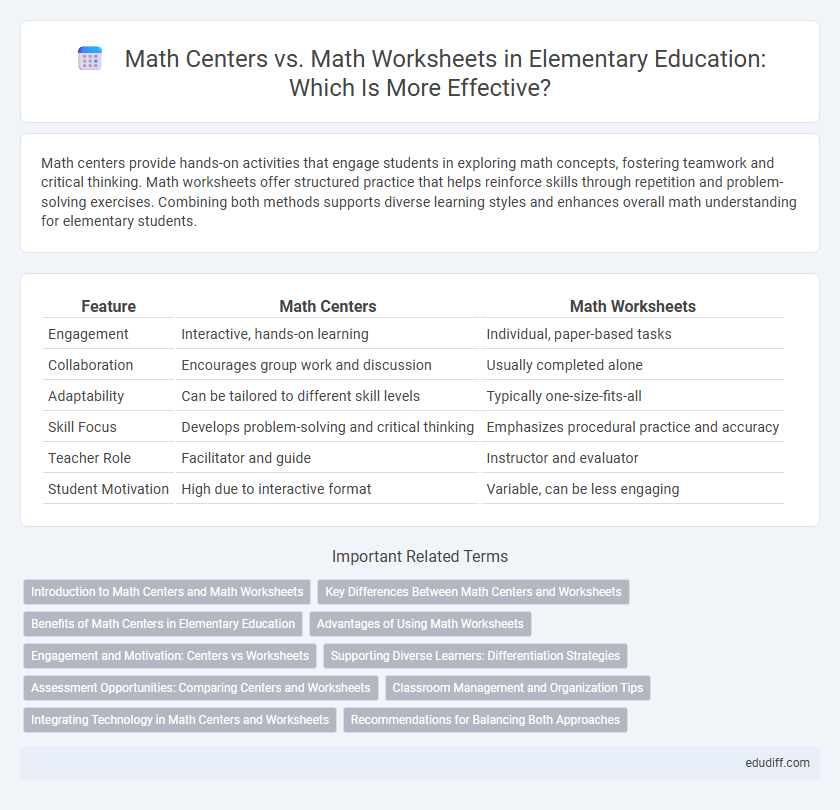Math centers provide hands-on activities that engage students in exploring math concepts, fostering teamwork and critical thinking. Math worksheets offer structured practice that helps reinforce skills through repetition and problem-solving exercises. Combining both methods supports diverse learning styles and enhances overall math understanding for elementary students.
Table of Comparison
| Feature | Math Centers | Math Worksheets |
|---|---|---|
| Engagement | Interactive, hands-on learning | Individual, paper-based tasks |
| Collaboration | Encourages group work and discussion | Usually completed alone |
| Adaptability | Can be tailored to different skill levels | Typically one-size-fits-all |
| Skill Focus | Develops problem-solving and critical thinking | Emphasizes procedural practice and accuracy |
| Teacher Role | Facilitator and guide | Instructor and evaluator |
| Student Motivation | High due to interactive format | Variable, can be less engaging |
Introduction to Math Centers and Math Worksheets
Math centers provide interactive learning stations where elementary students engage with hands-on activities to build math skills through exploration and collaboration. Math worksheets offer structured exercises designed to reinforce specific math concepts through repeated practice and individual work. Combining math centers with worksheets supports diverse learning styles by balancing active discovery with focused skill development.
Key Differences Between Math Centers and Worksheets
Math centers involve interactive, hands-on activities that encourage collaboration and critical thinking, while math worksheets are individual tasks focusing on practice and repetition. Centers promote problem-solving skills and conceptual understanding through manipulatives and group work, whereas worksheets emphasize skill reinforcement and assessment. The key difference lies in centers fostering engagement and exploration, contrasting with worksheets' role in drilling specific skills.
Benefits of Math Centers in Elementary Education
Math centers in elementary education foster hands-on learning, encouraging students to explore mathematical concepts through engaging activities that promote critical thinking and problem-solving skills. These centers provide opportunities for collaborative learning, allowing children to work in small groups, enhancing communication and social interaction while reinforcing math concepts. Unlike traditional math worksheets, math centers accommodate diverse learning styles, making math more dynamic and accessible for young learners.
Advantages of Using Math Worksheets
Math worksheets provide structured practice that helps reinforce fundamental math skills such as addition, subtraction, multiplication, and division. They offer consistent opportunities for assessment, enabling educators to identify student strengths and areas needing improvement efficiently. Using math worksheets supports individualized learning by allowing students to work at their own pace and review concepts repeatedly.
Engagement and Motivation: Centers vs Worksheets
Math centers boost student engagement by providing hands-on, interactive activities that encourage collaboration and exploration, making learning enjoyable and dynamic. In contrast, math worksheets often involve repetitive, individual tasks that can reduce motivation due to their passive nature and lack of variety. Incorporating math centers promotes sustained interest and active participation, which enhances motivation more effectively than traditional worksheets.
Supporting Diverse Learners: Differentiation Strategies
Math centers provide interactive, hands-on activities that cater to various learning styles, supporting diverse learners by allowing individualized pacing and targeted skill practice. In contrast, math worksheets often present uniform problems that can limit differentiation and fail to engage students with different needs. Implementing math centers encourages collaboration and critical thinking, making it easier to adapt tasks for learners requiring extra support or enrichment.
Assessment Opportunities: Comparing Centers and Worksheets
Math centers provide interactive assessment opportunities by allowing teachers to observe students' problem-solving strategies and collaboration skills in real-time. Worksheets primarily offer a static form of assessment focused on individual accuracy and completion but lack insight into students' thought processes. Combining both methods enhances a comprehensive understanding of students' mathematical abilities and areas needing support.
Classroom Management and Organization Tips
Math centers foster active student engagement and provide hands-on learning experiences that enhance understanding and retention in elementary classrooms. Effective classroom management during math centers involves clear routines, designated areas, and consistent rotation schedules to minimize disruptions and maximize instructional time. In contrast, math worksheets offer structured practice but require strategic organization and timely feedback to keep students focused and maintain classroom order.
Integrating Technology in Math Centers and Worksheets
Integrating technology in elementary math centers enhances interactive learning through tools like tablets and math gaming apps, which promote hands-on engagement and instant feedback. Digital math worksheets, equipped with adaptive features and automated scoring, personalize practice and track student progress efficiently. Combining technology with traditional math centers and worksheets creates a dynamic, multisensory environment that supports diverse learning styles and improves math fluency.
Recommendations for Balancing Both Approaches
Balancing math centers and math worksheets in elementary education enhances student engagement and skill development. Integrate hands-on activities at math centers to foster critical thinking alongside targeted practice with worksheets that reinforce foundational concepts. Allocate consistent time for both methods, ensuring varied learning experiences that cater to diverse student needs and promote comprehensive mathematical understanding.
Math Centers vs Math Worksheets Infographic

 edudiff.com
edudiff.com